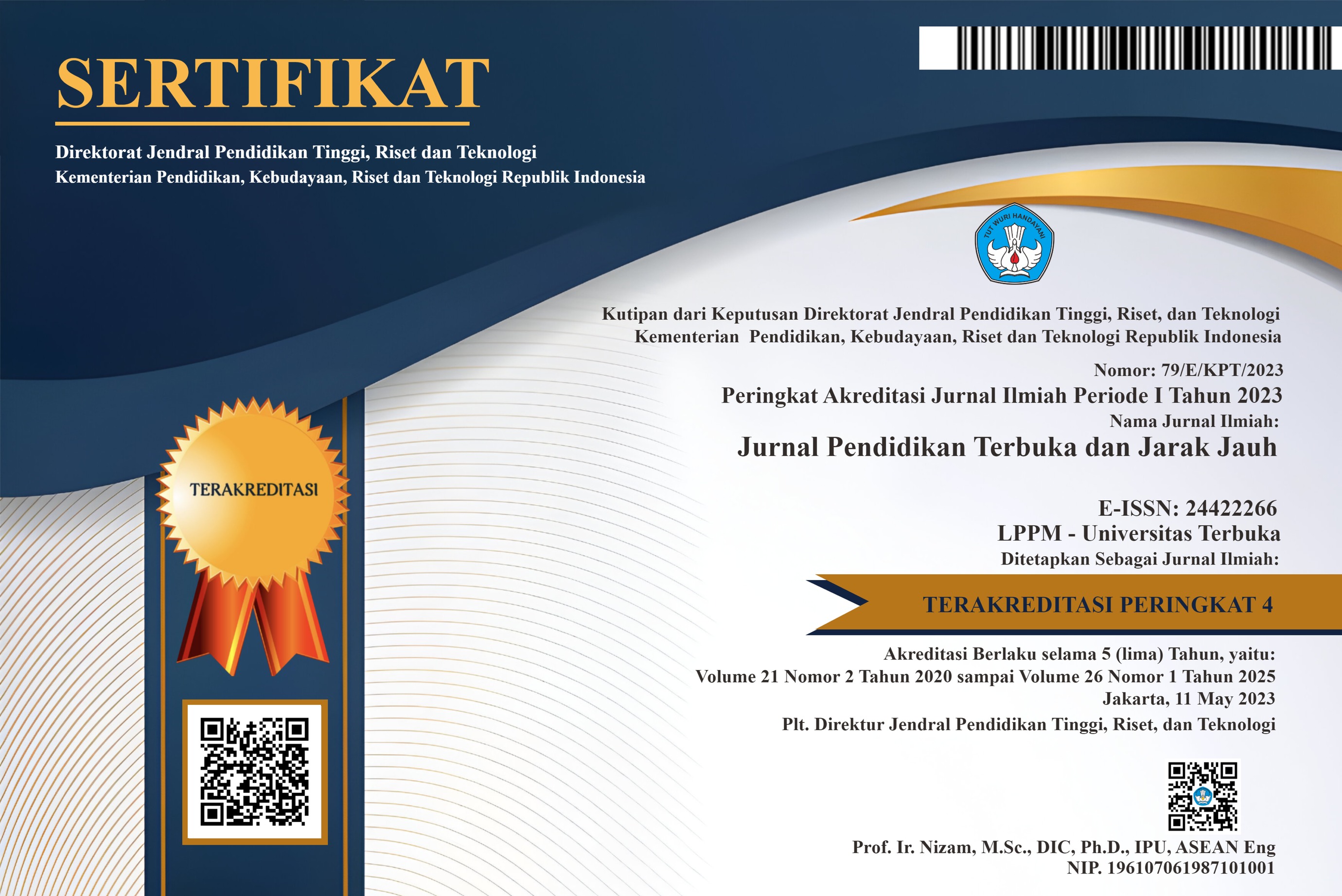Lobbying and Negotiation Techniques to Enhance Business Communication Skills through Virtual Reality Training: A Preliminary Study
DOI:
https://doi.org/10.33830/ptjj.v24i2.5586.2023Keywords:
virtual reality, distance education, lobbying, negotiationAbstract
Lobbying and negotiation skills are some of the required skills to succeed in business and social life. Conventional universities may develop their students’ skills through real-life scenarios while this could be challenging for open and distance universities which students are scattered around the world. Virtual Reality is an alternative technology that allows students to experience real-life scenarios in a simulated environment. This research aims to develop website-based Virtual Reality training to enhance learning in the business communication subject, with a specific focus on lobbying and negotiation techniques in distance education. This research adopts the Borg & Gall Research & Development (R&D) Method for educational research. This paper focuses on the preliminary stage which gathered the data required to construct a high-quality mood board and flowchart aligned with stakeholder needs to produce high-quality virtual reality training to enhance negotiation skills. Primary data is gathered through Focus Group Discussions involving students, tutors, and business communication practitioners. Additionally, secondary data is derived from extensive literature and document reviews, including relevant studies and documents. The result shows that informants are passionate about the idea of using virtual reality to enhance negotiation skills. Options of background, gender, and situation settings as well as interchangeable roleplay are preferred in boosting the motivation and enhancing the practical knowledge of negotiation skills.
References
Belawati, T. (2000). Pendidikan terbuka dan jarak jauh. Universitas Terbuka.
Borg, W. R., & Gall, M. D. (1983). Education research: an introduction (4th Edition). Longman Inc.
Broekens, J., Harbers, M., Brinkman, W.-P., Jonker, C. M., Bosch, K. van den, & Meyer, J.-J. Ch. (2012). Virtual reality negotiation training increases negotiation knowledge and skill. Lecture Notes in Computer Science. https://doi.org/10.1007/978-3-642-33197-8_23
Core, M., Traum, D., Lane, H. C., Swartout, W., Gratch, J., Van Lent, M., & Marsella, S. (2006). Teaching Negotiation Skills through Practice and Reflection with Virtual Humans. Simulation, 82(11), 685–701. https://doi.org/10.1177/0037549706075542
Fadilla, S., Juliana, A., Nurqamarani, A. S., Bisnis, P. A., & Artikel, R. (2023). PENERAPAN MANAJEMEN PENGETAHUAN DI PERGURUAN TINGGI TERBUKA DAN JARAK JAUH INFO ARTIKEL ABSTRAK. 14(1), 67–77. https://doi.org/10.31764
Holuša, V., Vaněk, M., Beneš, F., Švub, J., & Staša, P. (2023). Virtual Reality as a Tool for Sustainable Training and Education of Employees in Industrial Enterprises. Sustainability (Switzerland), 15(17). https://doi.org/10.3390/su151712886
Huitt, W. (2011). Bloom et al.’s Taxonomy of the Cognitive Domain. http://www.edpsycinteractive.org/topics/cogsys/bloom.html
ImaginusVR. (2021). Why 3D Models are Great for Education | by ImaginusVR | Medium. https://medium.com/@ImaginusVR/why-3d-models-are-great-for-education-692b2f9c03ab
Iriantara, Yosal, Tatang Subarna, & Saeful Rochman. (2008). Modul Komunikasi Bisnis (2nd ed.). Pusat Penerbitan Universitas Terbuka.
Juliana, A., Shabrina Nurqamarani, A., Fadila, S., & Aripin, S. (2022). Virtual Reality in Business Education: Systematic Literature Review. Lembaran Ilmu Kependidikan , 51(1). http://journal.unnes.ac.id/nju/index.php/LIK
Kavanagh, S., Luxton-Reilly, A., Wuensche, B., & Plimmer, B. (2017). A systematic review of Virtual Reality in education. Themes in Science & Technology Education, 10(2), 85–119.
Krokos, E., Plaisant, C., & Varshney, A. (2019). Virtual memory palaces: immersion aids recall. Virtual Reality, 23(1), 1–15. https://doi.org/10.1007/s10055-018-0346-3
Lewicki, R. J. , B. B. and S. D. M. (2020). Negotiation (8th ed.). McGraw Hill.
McGovern, E., Moreira, G., & Luna-Nevarez, C. (2020a). An application of virtual reality in education: Can this technology enhance the quality of students’ learning experience? Journal of Education for Business, 95(7), 490–496. https://doi.org/10.1080/08832323.2019.1703096
McGovern, E., Moreira, G., & Luna-Nevarez, C. (2020b). An Application of Virtual Reality in Education: Can This Technology Enhance the Quality of Students’ Learning Experience? In Journal of Education for Business (Vol. 95, Issue 7, pp. 490–496).
Merchant, Z., Goetz, E. T., Cifuentes, L., Keeney-Kennicutt, W., & Davis, T. J. (2014). Effectiveness of virtual reality-based instruction on students’ learning outcomes in K-12 and higher education: A meta-analysis. Computers and Education, 70, 29–40. https://doi.org/10.1016/j.compedu.2013.07.033
Nurbadi, M. S. (2018). Aplikasi Berbasis Virtual Reality untuk Mendukung Proses Pembelajaran Organ Pencernaan Manusia. Jurnal Ilmiah Bidang Teknologi Informasi Dan Komunikasi, 2(3), 12–15. https://dspace.uii.ac.id/handle/123456789/11883
Priyatna, S. dan E. A. (2009). Tujuh Pilar Komunikasi Bisnis. Widya Padjajaran.
Sumartias, S. (2016). Komunikasi Bisnis. Universitas Terbuka.
Whitton, N. (2013). Games for Learning. International Review of Qualitative Research, 6(3), 424–439. https://doi.org/10.1525/irqr.2013.6.3.424
Young, G. W., Stehle, S., Walsh, B. Y., & Tiri, E. (2020). Exploring Virtual Reality in the Higher Education Classroom: Using VR to Build Knowledge and Understanding. In Journal of Universal Computer Science (Vol. 26, Issue 8).
Downloads
Published
Versions
- 03-01-2024 (3)
- 03-01-2024 (2)
- 29-12-2023 (1)
How to Cite
Issue
Section
License
Copyright (c) 2023 Adisthy Nurqamarani, Ari Juliana, Rachmawati Windyaningrum

This work is licensed under a Creative Commons Attribution-ShareAlike 4.0 International License.





